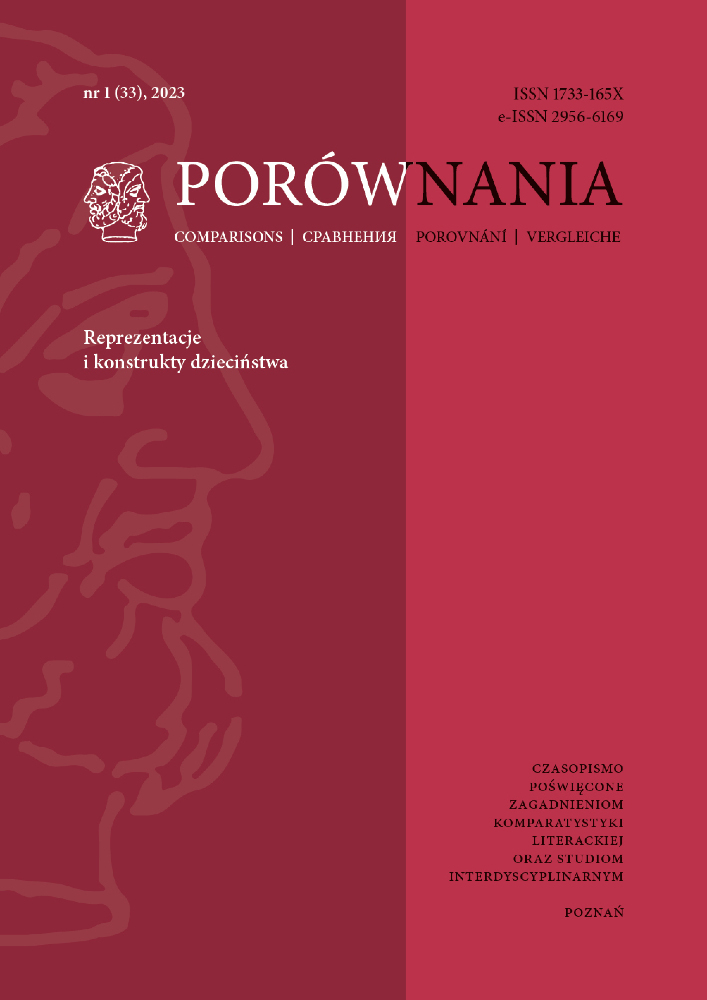Abstract
The article provides a comparative analysis of Joanna Bator’s Cloudalia and Sandra Cisneros’ Caramelo with regard to similar identity construction of the main female characters. Both authors concentrate on young women (Dominika Chmura in Cloudalia and Celaya Reyes in Caramelo) who set out for a journey of feminist self-discovery, crossing the boundaries of geography, history and culture. The author of the article argues that, despite the obvious differences between Poland and Mexico, the protagonists rebel against the same legacy of the Catholic patriarchal culture, reinforced by national visions of history and literary canon in the respective countries, and they gradually manage to rework historical trauma by reconstructing the doppelganger figure and creating new transcultural feminist paradigms. The arguments are reinforced not only by references to autobiographical motives in Bator’s and Cisneros’ fiction and diaries, but also by transnational identity studies of Zygmunt Bauman and Amaryll Chanady.
References
Alumbach, Heather. “Narrative Coyotes: Migration and Narrative Voice in Sandra Cisneros’ Caramelo.” MELUS 35.1 (2010): 53–75. DOI: https://doi.org/10.1353/mel.0.0070
Anderson, Benedict. Imagined Communities: Reflections on the Origin and Spread of Nationalism. New York: Verso Books, 2016.
Anzaldúa, Gloria. The Gloria Anzaldúa Reader. Ed. A.Keating. Durham-London: Duke University Press, 2009. DOI: https://doi.org/10.1215/9780822391272
Bator, Joanna. Chmurdalia. Kraków: Wydawnictwo Znak, 2019.
Bator, Joanna. Feminizm, postmodernizm, psychoanaliza. Filozoficzne dylematy feministek “drugiej fali.” Gdańsk: słowo/obraz/terytoria, 2001.
Bator, Joanna. Piaskowa góra. Kraków: Wydawnictwo Znak, 2019.
Bator, Joanna. Wyspa Łza od nowa. Kraków: Wydawnictwo Znak, 2020.
Bauman, Zygmunt. Liquid Fear. Cambridge: Polity Press, 2006.
Bauman, Zygmunt. Retrotopia. Cambridge: Polity Press, 2007.
Benjumea, P. “Caramelo.” Journal of Latinos and Education 2.4 (2003): 255–256. DOI: https://doi.org/10.1207/S1532771XJLE0204_7
Brandotti, Rosi. Nomadic Subjects. Embodiment and Sexual Difference in Contemporary Feminist Theory. New York: Columbia University Press, 2011.
Burzyńska, Anna, Michał Paweł Markowski. Teorie literatury XX wieku. Kraków: Wydawnictwo Znak, 2009.
Chanady, Amaryll. “The Trans-American Outcast and Figurations of Displacement.” Comparative Literature 61.3 (Summer 2009): 335–345. DOI: https://doi.org/10.1215/00104124-2009-020
Cisneros, Sandra. A House of My Own. Stories from My Life. New York: Alfred A.Knopf, 2015.
Cisneros, Sandra. Caramelo. New York: Vintage Contemporaries, 2002.
Cisneros, Sandra. Women Hollering Creek, Random House, New York, 1991.
Czapliński, Przemysław. Poruszona mapa. Kraków: Wydawnictwo Literackie, 2016.
Domańska, Ewa. “Autofikcja Joanny Bator.” Teksty drugie 2–3 (2003): 336–345.
Duda, Maciej. “Ciemne i jasne. Tożsamościowe zmagania straumatyzowanych bohaterek Joanny Bator.” Czas Kultury 4 (2021): 138–148.
Ganz, Robin. Border Crossing and Beyond, MELUS 19.1 (1994): 19–29. DOI: https://doi.org/10.2307/467785
Głowa, Wioletta. “Nomadyzm kobiecy jako wariant drogi do/ku wolności w powieściach Joanny Bator.” Świat tekstów. Rocznik Słupski 17 (2019): 151–164.
Janion, Maria. Niesamowita słowiańszczyzna. Kraków: Wydawnictwo Literackie, 2007.
Kurkiewicz, Juliusz. “Saga na opak.” Gazeta Wyborcza 1 June 2010. Accessed 1 June 2021.
Paz, Octavio. Labirynt samotności. Kraków: Wydawnictwo Literackie, 1991.
Quintana. A. E. “Borders Be Damned. Creolizing Literary Relations.” Cultural Studies 13.2 (1999): 358–366. DOI: https://doi.org/10.1080/095023899335338
Rebolledo, Diana Tey. Women Singing in the Snow: A Cultural Analysis of Chicana Literature. Tucson: The University of Arizona Press, 1995.
Ugrešić, Dubravka. Lis. Kraków: Wydawnictwo Literackie, 2017.
Vásquez, D. T. Triangulations. Narrative Strategies For Narrating Latino Identity. Minneapolis: University of Minnesota Press, 2011. DOI: https://doi.org/10.5749/minnesota/9780816673261.001.0001
License
Copyright (c) 2023 Agnieszka Gondor-Wiercioch

This work is licensed under a Creative Commons Attribution-NoDerivatives 4.0 International License.
Utwory opublikowane w czasopiśmie „Porównania”, na platformie Pressto należącej do Uniwersytetu im. Adama Mickiewicza w Poznaniu są udostępniane na licencji Creative Commons Uznanie autorstwa - Bez utworów zależnych 4.0 Międzynarodowe (CC BY-ND 4.0)
Tym samym wszyscy zainteresowani są uprawnieni do korzystania z utworów opublikowanych pod następującymi warunkami:
-
uznania autorstwa — czyli obowiązek podania wraz z rozpowszechnianym utworem informacji o autorstwie, tytule, źródle (odnośniki do oryginalnego utworu, doi) oraz samej licencji
-
bez utworów zależnych — remiksując, przetwarzając lub tworząc na podstawie utworu, nie wolno rozpowszechniać zmodyfikowanych treści.
-
brak dodatkowych ograniczeń — nie można korzystać ze środków prawnych lub technologicznych, które ograniczają innych w korzystaniu z utworu na warunkach określonych w licencji.
Uniwersytet im. Adama Mickiewicza w Poznaniu zachowuje prawo do czasopisma jako całości (układ, forma graficzna, tytuł, projekt okładki, logo itp.).
Autor zachowuje prawa majątkowe, ale udziela zgody Uniwersytetowi im. Adama Mickiewicza w Poznaniu na wykorzystanie dzieła. Autorzy tekstów zakwalifikowanych do publikacji proszeni są o wypełnienie podpisanie i przesłanie umowa (PL) agreement (EN)
Agreement for granting a royalty-free license to works with a commitment to grant a CC sub-license





